Last Updated on March 23, 2025
Table of Contents
What is the Elder Futhark?
The Elder Futhark are the oldest form of the runic alphabet, used by Germanic tribes from the 2nd to the 8th century. It consists of 24 runes, each with its own unique symbolism and sound. These runes served as a writing system, but their significance extends beyond mere communication. They were deeply intertwined with the spiritual and cultural practices of the ancient Norse and Germanic peoples.
In Asatru, the Elder Futhark runes carry a sense of mystery and sacredness. Practitioners view these runes as powerful symbols that connect them to the divine and the natural world. Each rune represents a specific force or concept, such as strength, protection, or transformation. When used in rituals, divination, or meditation, the runes act as conduits for understanding the will of the gods or the flow of natural energies.
First Ætt of the Elder Futhark
Fehu
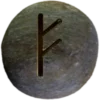
(FAY-hoo)
(ᚠ) Fehu, Feoh, Fe, Fé
Wealth, abundance, and prosperity. It represents material success and the energy of creation. In Asatru, Fehu embodies the power to attract resources and maintain balance in life’s endeavors.
Ūruz
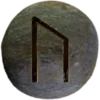
(OO-rooz)
(ᚢ) Ūruz, Uruz, Ur, Urox, Uraz
Symbolizes primal strength, endurance, and untamed power. Representing the wild aurochs, it embodies raw vitality and the courage to face challenges. In Asatru, Ūruz encourages resilience and personal growth through struggle.
Thurisaz
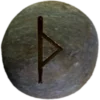
(THOO-ree-sahz)
(ᚦ) Thurisaz, Thurs, Thuris, Thorn
Represents the force of destruction and chaos and is often linked to giants. It symbolizes powerful, raw energy that can be both protective and dangerous, urging caution and awareness when facing challenges or making decisions.
Ansuz
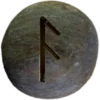
(AHN-sooz)
(ᚨ) Ansuz, Ansur
Communication, wisdom, and divine inspiration. It connects to Odin, representing knowledge, speech, and spiritual insight. Use this rune to enhance clarity, express ideas effectively, and seek guidance from higher powers.
Raido
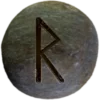
(RAY-thoh)
(ᚱ) Raido, Raidho, Rad, Reid
Symbolizes journey, movement, and life’s path. It represents travel, both physical and spiritual, guiding one toward a destination or goal. Raido encourages taking action, making progress, and embracing the journey’s lessons.
Kenaz
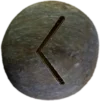
(KAY-nahz)
(ᚲ) Kenaz, Kaunan, Kaun, Kano, and Cen
Associated with fire and torch, symbolizes transformation, creativity, and enlightenment. It represents the destructive and purifying power of fire, urging personal growth and clarity through challenges.
Gebō
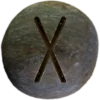
(GAY-boh)
(ᚷ) Gebō, Gebo, Gyfu, Gipt, Geofu
Symbolizes “gift” or “exchange.” It represents generosity, partnerships, and mutual giving. In Asatru, it highlights the importance of balance in relationships and the sacredness of reciprocity.
Wunjō
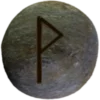
(WOON-yoh)
(ᚹ) Wunjō, Wunjo, Wynn, Winya
Represents joy, harmony, and well-being. It symbolizes the fulfillment of desires and a state of inner peace, reflecting a balanced and positive connection with one’s surroundings.
Second Ætt
Hagalaz
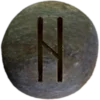
(HAH-gah-lahz)
(ᚺ) Hagalaz, Hagal, Hagall, Haegl
The Hagalaz rune signifies the destructive yet transformative power of nature. It teaches resilience and adaptation, reminding followers that challenges and hardships are essential for personal and spiritual growth.
Nauthiz
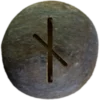
(NOW-thiz)
(ᚾ) Nauthiz, Naudiz, Nauthiz, Nyd, Nauthr
A powerful force driving resilience in challenging times, this symbol emphasizes the necessity of endurance and self-discipline. It represents overcoming obstacles, turning adversity into a catalyst for growth and transformation.
Isaz
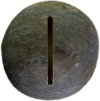
(EE-sahz)
(ᛁ) Isaz, Is, Isa, Iss
Represents ice, stillness, and obstacles. It advises patience and caution, signaling a time to pause, reflect, and find clarity in challenges.
Jēra
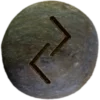
(YAY-rah)
(ᛃ) Jēra, Jara, Jer, Ger
Denotes the natural cycle of time, particularly the harvest. It signifies hard-earned rewards, growth, and the importance of patience, as success follows consistent effort and seasonal rhythms.
Eihwaz
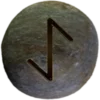
(AY-wahz)
(ᛇ) Eihwaz, Eoh, Eyz, Ihwar
A symbol of resilience and protection, it represents the strength to endure life’s challenges and the journey between life and death, emphasizing spiritual growth and transformation.
Perthro
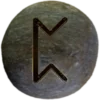
(PER-throh)
(ᛈ) Perthro, Peorth, Perth, Pertho
This rune symbolizes mystery, fate, and the unknown. It represents hidden knowledge and the unfolding of destiny. Embrace uncertainty, trusting in the process and the deeper wisdom at work.
Algiz
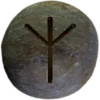
(AHL-geez)
(ᛉ) Algiz, Elhaz, Eolh, Ihwar
Represents protection, defense, and divine support. It serves as a guardian, shielding against harm and guiding you toward safety. Embrace its energy for strength and resilience.
Sowilō
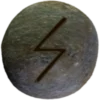
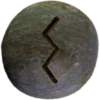
(SOH-wee-loh)
(ᛊ or 𐌔) Sowilō, Sowilo, Sól, Sigel
Symbolizing the sun, it represents success, vitality, and enlightenment. It embodies energy, guidance, and clarity, empowering one to achieve goals and overcome challenges with determination.
Third Ætt
Tiwaz
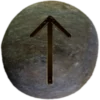
(TEE-wahz)
(ᛏ) Tiwaz, Týr, Teiwaz, Tiw
Symbolizes honor, justice, and courage, representing the god Týr. It embodies self-sacrifice, integrity, and the pursuit of righteousness. Tiwaz guides individuals to make just decisions, even at personal cost, reflecting the warrior’s code and moral strength.
Berkanan
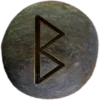
(BER-kah-nahn)
(ᛒ) Berkanan, Berkano, Beorc, Bjarkan
Represents growth, fertility, and renewal in Asatru. It is often associated with birch trees, representing new beginnings and maternal protection. Berkanan signifies the nurturing aspects of nature and the cycle of life, death, and rebirth.
Ehwaz
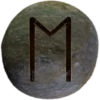
(AY-wahz)
(ᛖ) Ehwaz, Eh, Eoh, Ehw
Symbolizing trust, partnership, and movement, this Elder Futhark rune reflects harmonious teamwork and progress. It represents the bond between horse and rider, emphasizing loyalty, cooperation, and dynamic forward momentum.
Mannaz
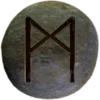
(MAHN-ahz)
(ᛗ) Mannaz, Mann, Man, Madhr
Embodies humanity, community, and self-awareness. It encourages cooperation and understanding within a group. Mannaz also symbolizes personal growth, urging individuals to embrace their true potential.
Laguz
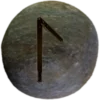
(LAH-gooz)
(ᛚ) Laguz, Lag, Lagu, Lög
This rune symbolizes water, flow, and intuition. It represents emotional depth and the subconscious mind. Trust your instincts and embrace the natural rhythm of life’s currents.
Ingwaz
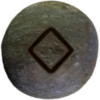
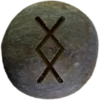
(ING-wahz)
(ᛜ or ᛝ) Ingwaz, Ing, Ingw, Inguz
These symbols represent potential, growth, and transformation. It signifies energy contained within, waiting for release, and aligns with themes of fertility, renewal, and the promise of future prosperity.
Dagaz
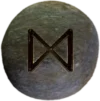
(DAH-gahz)
(ᛞ) Dagaz, Dag, Dagr, Daeg
This rune symbolizes new beginnings, clarity, and transformation. It represents the light of dawn, marking a significant shift toward enlightenment, hope, and positive change.
Othila
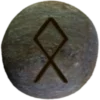
(OH-thee-lah)
(ᛟ) Othila, Othala, Odal, Ethel
Symbolizes heritage, inheritance, and ancestral property. It represents family connections, home, and the values passed down through generations. It’s about preserving traditions and legacy
